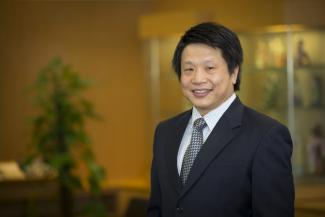
When choosing a degree to pursue, there are many factors taken into consideration – passion, practicality, and for some, simply the lack of choice. However, in a competitive market and economy, it is even more important to choose a degree that is versatile across varied industries and sectors.
One common misconception for accounting degrees is that it leads you to be an accountant and nothing more. In fact, the versatility of an accounting degree is something that not many are aware of. The truth is, the nature of an accounting degree opens you up to a broad range of career options with just one skill set. Today, we speak to Associate Professor of Accounting (Practice) Cheng Nam Sang to find out more about his extensive experience in both industry and academia.
Dr Cheng is a member of the Institute of Chartered Accountants in England and Wales (ICAEW), the Institute of Singapore Chartered Accountants (ISCA) and CPA Australia. Prior to joining SMU, he was involved in fund raising, provided mergers and acquisitions advisory services, and had held a number of senior positions including that of CFO, COO, and chairman of audit and remuneration committees in two Singapore-listed companies involving semi-conductor and retails industries respectively. His prior work experience from Price Waterhouse (a legacy firm of PricewaterhouseCoopers) at its UK and Singapore offices provided him with a solid foundation and a wide range of industrial exposure for his career advancement.
As we ponder over the versatility of accounting and its uses, we speak to Dr Cheng as his accounting exposure and careers started from his choice to read Accounting and Finance at University of Warwick and London School of Economics. One of the modules that he is teaching now in the MPA programme is Management Accounting.
Hi Prof Cheng! Perhaps you could share with us a little about why you chose accounting in the first place.
I chose accounting because accounting has always been a more conservative career path, which opens more doors for future career advancements regardless of the state of economy and country boundaries. I was not wrong. Through my different exposures and opportunities in different industries and different countries, the accounting skill sets that I got was extremely useful.
With your extensive industry experience, could you tell us how accounting is relevant to students who are keen to kick-start their careers in a corporate firm instead of a traditional accounting role? In fact, many looking to join the Big 4 only think of becoming an auditor, could you share about the other departments and the career progression.
Accounting degrees provide students not only with technical skills but also with the highly sought analytical skills and other critical aspects of conducting businesses such as professionalism, ethical practices, and interpersonal and communication skills. In fact, many accountancy students do not practice auditing and accounting after graduation. Consultancy, banking, fund and investment management, multi-national corporations and education are some popular alternatives. Many CEOs of organizations are equipped with accountancy degree and/or accounting professional qualifications. I have met many of them during my audit and consultancy projects.
Even for those joining audit firms after graduation, many do not stay in the audit profession. They may move to various industries after acquiring exposure in different industries and eventually move to the industry that they are more interested in. I have seen many of my ex-colleagues becoming COO or CFO of banks, insurance companies, and various listed companies. Of course, there are some staying on in the audit profession and eventually becoming partners of audit firms.
Where are students seeing themselves work after a degree in accounting and what skill sets (aside from those accounting skills) are crucial for them to survive in the workplace?
Many of the MPA alumni I have taught are now in different industries covering banks, audit firms, compliance consultation firms, MNCs and more. Depending on prior experience, academic results and interview performance, it is possible for students to join other services other than audit and taxation in audit firms. These include mergers and acquisitions (transaction services), forensic services, and business restructuring. Students who join the audit department may also have the opportunity to work on assignment in these areas during their non-peak auditing period. I had the opportunities to work on judicial management assignment, mergers and acquisitions, and corporate finance projects during my stay in a Big 4 audit firm.
I have been teaching MPA management accounting since 2013. During my class of MPA management accounting, I always emphasise the importance of understanding the principles and systems. My ultimate objective is ensure that students can apply the knowledge to real life applications regardless of situations and scenarios without the needs to memorising any equations. Students are also encourage to share their experience in class or through discussion forum. We use many real life examples to support the theories and class discussions.
Although accounting degrees provide vast opportunities and variety of job exposures, accounting, like many aspects of the world, is a progressive changing subject and profession. We need to continuously upgrade ourselves and equip ourselves with the latest knowledge and skills in order to be successful. Therefore, I am also working on research work in the area of sustainability, and cultural aspects in accounting. After all, if students do not learn to adapt to changes and lifelong learning, they would not succeed in the corporate world.
For more information about the MPA programme, visit www.smu.edu.sg/mpa. You may also sign up for our upcoming information sessions to have a chat with our admissions advisor on how the MPA can help you build your career!